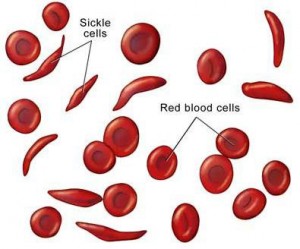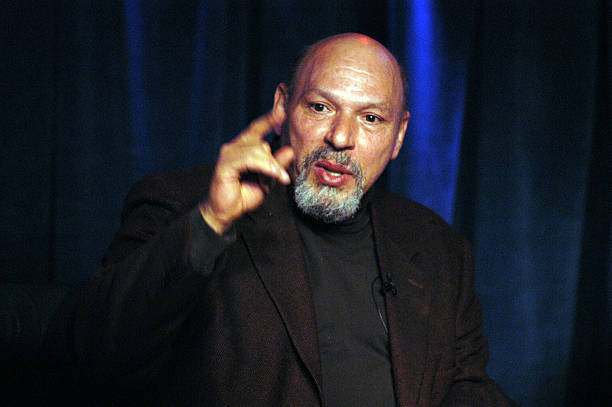(ThyBlackMan.com) Normal red blood cells move easily through your blood vessels, taking oxygen to every part of your body. But in sickle cell disease, these normal, round red blood cells are instead shaped like a crescent (the name “sickle cell” comes from the crescent shape of the cell, similar to the farm tool with a curved blade that can cut crops like wheat). The sickle-shaped blood cells easily stick together, blocking blood vessels, and stopping the oxygen they contain from getting through.
This process can cause a lot of pain. It can also hurt organs, muscles and bones.
According to the Centers for Disease Control and Prevention, sickle cell disease affects an estimated 70,000 to 100,000 Americans. About 1 in 12 African Americans carry the sickle cell trait, and the disease occurs in about 1 in every 500 African American births. The disease originated in at least 4 places in Africa and in the Indian/Saudi Arabian subcontinent. It exists in all countries of Africa and in areas where Africans have migrated.
Having sickle cell disease means a lifelong battle against the health problems it  can cause, such as pain, infections, anemia and stroke. Since some symptoms are more serious than others, it’s very important to know when you need to contact your doctor or other healthcare professionals for help.
can cause, such as pain, infections, anemia and stroke. Since some symptoms are more serious than others, it’s very important to know when you need to contact your doctor or other healthcare professionals for help.
In Case Of An Emergency…
As part of your sickle cell management plan, be sure to make a plan with your doctor that includes where and when to get treatment in case of a sickle cell emergency.
Also, call 911 or another emergency service immediately if you have:
• Difficulty breathing or shortness of breath
• Chest pain
• Severe abdominal pain
• Sudden weakness
• Sudden numbness or tingling in the hands, feet, fingers, or toes (even if it goes away on its own)
• Sudden poor balance and poor coordination when walking (even if it goes away on its own)
• Confusion (even if it goes away on its own)
• Garbled speech or an inability to speak (even if it goes away on its own)
• Sudden change in vision
• Severe headache
• Loss of consciousness
• Fever higher than 101F
• Severe cough
• Repeated vomiting or persistent diarrhea
• A sudden increase in the size of your or your child’s spleen (Learn from your doctor how to feel your child’s spleen to check its size.)
• Increased paleness
• Lightheadedness
• Persistent erection of the penis (priapism) that lasts more than 3 hours or is extremely painful
• Severe pain that can’t be relieved with your usual prescription painkilling drugs or other pain-relief methods
Watchful Waiting
Watchful waiting is when you and your doctor watch your symptoms to see if your health improves on its own. If it does, no treatment is necessary. If your symptoms don’t get better or get worse, then it’s time to take the next treatment step. Some complications of sickle cell disease may not need immediate medical attention from a doctor. In these cases, you can try home treatment.
• Medicine. Painful events can be treated at home depending on how severe the pain is and how long you’ve had it. Try over-the-counter pain medicine for mild pain. Or take a stronger medicine, if prescribed by your doctor. If this doesn’t work, contact your doctor or seek emergency medical treatment.
• Fluids.You may treat persistent, painful erection of the penis (priapism) at home by drinking fluids, taking over-the-counter pain medicine, and urinating as much as possible. If this doesn’t solve the problem within 2 to 3 hours, seek emergency medical treatment.
Which Doctors Can Provide The Best Help?
If you or your child has sickle cell disease, try to find a doctor who has special training for this disease. Some medical centers and hospitals specialize in sickle cell disease treatment and support. If your local community doesn’t offer this option, look for a doctor and a pain treatment specialist who have experience in treating sickle cell disorders. Choose a doctor you are comfortable with and can partner with over the long term.
The following types of health professionals can diagnose and help treat symptoms of sickle cell disease. Some of these health professionals may provide specialized treatment or counseling.
• Hematologist
• Family medicine physician
• General practitioner
• Pediatrician
• Pain management specialist
• Pediatric hematologist-oncologist
• Pulmonologist
• Neurologist
• Ophthalmologist
• General surgeon
• Medical geneticist
Yes, dealing with sickle cell disease can be challenging, but with so many innovative medical treatments available, it is very possible to live a long and rich life by partnering with your doctor.
Written by Lorraine Jones




















Leave a Reply